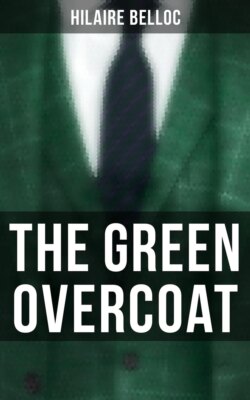Читать книгу The Green Overcoat - Hilaire Belloc - Страница 3
ОглавлениеMy dear Maurice,
You wrote something called The Green Elephant, and I have written something called The Green Overcoat.
It is on this account that I dedicate to you my work The Green Overcoat, although (and I take this opportunity of reproaching you for the same) you did not dedicate to me your work The Green Elephant.
An overcoat and an elephant have much in common, and also, alas! much in which they differ. An elephant can be taken off, and so can an overcoat; but, on the other hand, an overcoat can be put on, and an elephant can not. I understand that your elephant was not a real elephant; similarly my overcoat is not a real overcoat, but only an overcoat in a book. An overcoat is the largest kind of garment, and an elephant is the largest kind of beast, unless we admit the whale, which is larger than the elephant, just as a dressing-gown is larger than an overcoat; but this would lead me far! Then, again, the elephant does not eat meat, or bite; nor does an overcoat. He is most serviceable to man; so is an overcoat. There are, however, rogue elephants which are worse than useless, and give less profit to their owner than if he had no elephant at all. The same is true of overcoats, notably of those which have got torn in the lining of the left armpit, so that the citizen on shoving his left arm therein gets it into a sort of cul-de-sac, which is French for blind-alley.
The elephant is expensive, so is the overcoat. The elephant is of a grave and settled expression, so is an overcoat. An overcoat hanging by itself upon a peg is a grave and sensible object, which in the words of the philosopher "neither laughs nor is the cause of laughter." So is an elephant encaged.
Again, man in conjunction with the elephant is ennobled by that conjunction, whether he ride upon its back or upon its neck or walk by its side, as does the keeper at the Zoo. The same is true of overcoats, which, whether we have them upon our backs or carry them over our arms, add something to our appearance. I could suggest many other points in common were this part of my work lucrative, and, as it were, in the business; but it is not, and I must end. I might remind you that elephants probably grow old (though no man has lived to see it), that overcoats certainly do; that elephants are of divers sex, and this is true also of the overcoat. On the other hand, an overcoat has no feet and it has two tails or none, whereas the elephant has four feet and but one tail, and that a very little one.
I must wind up by telling you why I have written of an "overcoat" and not a "greatcoat." "Greatcoat" is the more vernacular; "overcoat" I think the more imperial. But that was not my reason. I wrote "overcoat" because it was a word similar in scansion and almost equivalent in stress-scheme (wow!) to the word "elephant." Of course, if I had considered length of syllable and vowel-value it would have been another matter, for "elephant" consists in three shorts, "overcoat" in a long, short and long. The first is a what-you-may-call-'um, and the second a thingumbob.
But I did not consider vowel sounds, and I was indifferent to longs and shorts. My endeavour was to copy you, and to have a title which would get people mixed up, so that the great hordes of cultivated men and women desiring to see your play should talk by mistake of The Green Overcoat.
And then their aunts, or perhaps a prig-visitor, would say: "Oh, no, that is the book!" In this way the book would be boomed. That was my game.
If people had done this sort of thing before it would not work now; but they haven't.
Now, Maurice, I end this preface, for I cannot think of anything more to write.
H. BELLOC.
